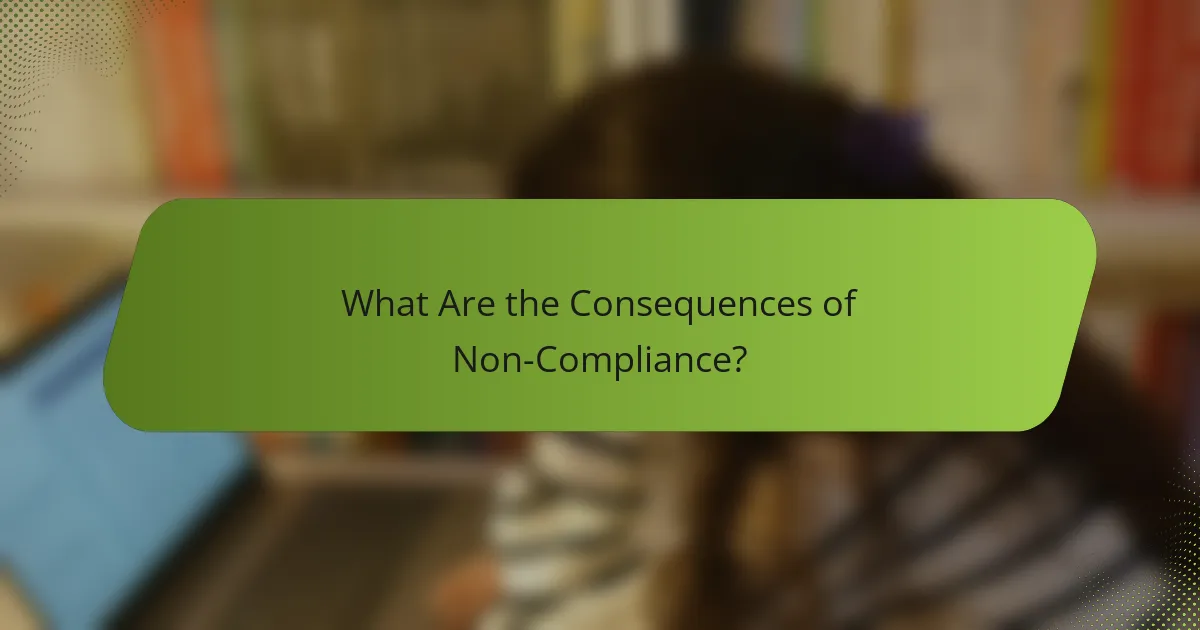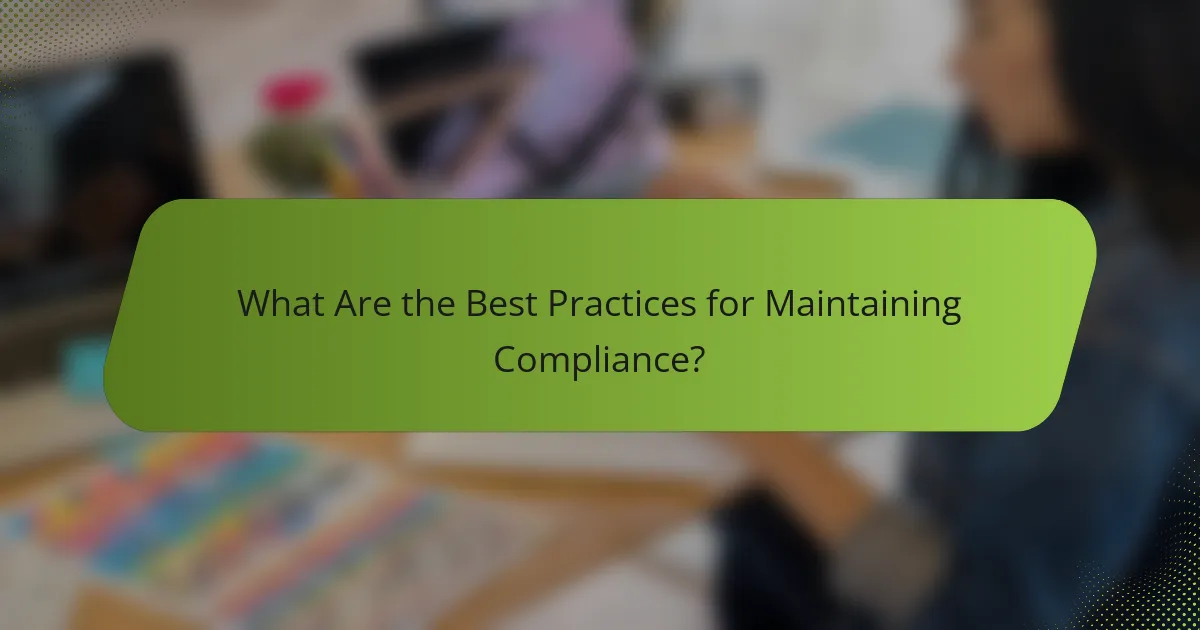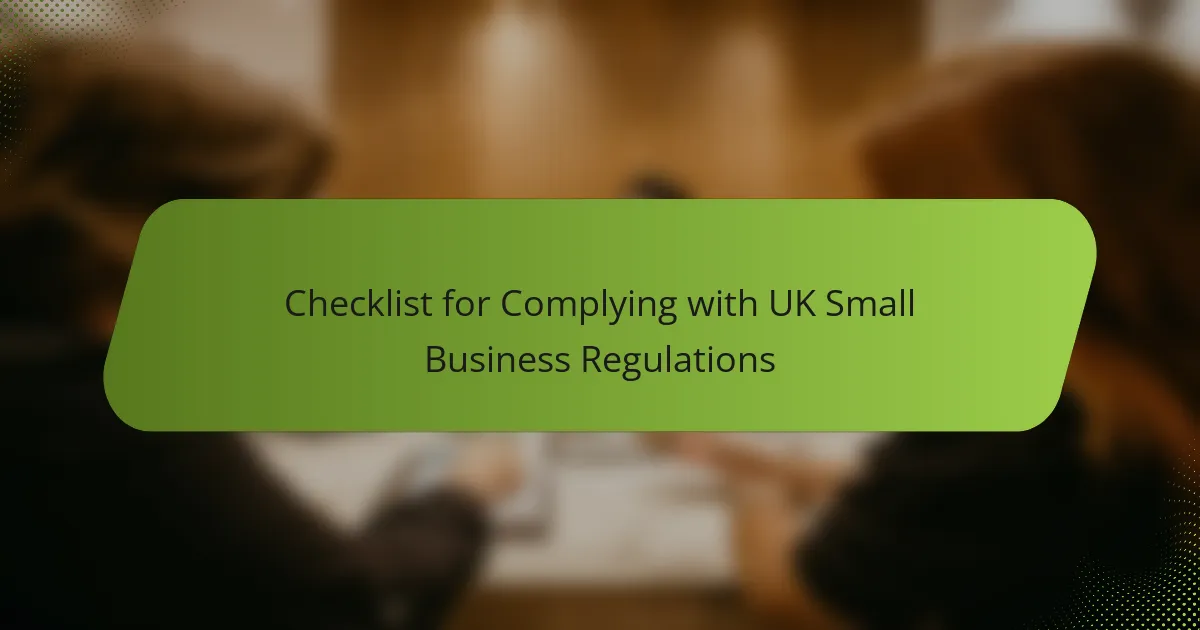Complying with UK small business regulations is vital for ensuring safety, protecting data, and upholding consumer rights. By familiarizing yourself with the relevant laws, you can align your operations with legal requirements, thereby minimizing risks and enhancing your business’s credibility. Understanding the potential repercussions of non-compliance is essential for safeguarding your enterprise’s reputation and financial stability.

What Are the Key Regulations for UK Small Businesses?
UK small businesses must comply with various regulations that ensure safety, data protection, fair employment, environmental responsibility, and consumer rights. Understanding these key regulations is essential for legal compliance and operational success.
Health and Safety Regulations
Health and safety regulations in the UK require businesses to ensure a safe working environment for employees and visitors. This includes conducting risk assessments, providing necessary training, and maintaining equipment to prevent accidents.
Small businesses should familiarize themselves with the Health and Safety at Work Act 1974, which outlines employer responsibilities. Regular safety audits and employee feedback can help identify potential hazards and improve workplace safety.
Data Protection Act Compliance
The Data Protection Act 2018 governs how businesses handle personal data. Companies must ensure they collect, store, and process personal information lawfully and transparently, respecting individuals’ privacy rights.
To comply, small businesses should implement clear data protection policies, train staff on data handling, and appoint a Data Protection Officer if necessary. Regular audits can help maintain compliance and address any data breaches promptly.
Employment Law Requirements
Employment law in the UK sets out the rights and responsibilities of employers and employees. Key areas include contracts, wages, working hours, and anti-discrimination laws, which protect employees from unfair treatment.
Small businesses should provide written contracts to employees, ensure they meet minimum wage requirements, and adhere to working time regulations. Regularly reviewing policies and staying updated on changes in employment law is crucial for compliance.
Environmental Regulations
Environmental regulations require businesses to minimize their impact on the environment. This includes waste management, emissions control, and resource conservation practices.
Small businesses should assess their environmental footprint and implement sustainable practices, such as recycling and energy efficiency measures. Compliance with the Environmental Protection Act 1990 is essential for avoiding fines and promoting sustainability.
Consumer Rights Act Obligations
The Consumer Rights Act 2015 protects consumers by ensuring they receive goods and services that meet certain standards. Businesses must provide clear information about products and services, as well as fair terms and conditions.
Small businesses should ensure that their products are of satisfactory quality and fit for purpose. Implementing a straightforward returns policy and addressing customer complaints promptly can enhance consumer trust and compliance with the Act.

How to Prepare for Regulatory Compliance?
Preparing for regulatory compliance involves understanding the specific laws and regulations that apply to your small business in the UK. This preparation ensures that your operations align with legal requirements, minimizing the risk of penalties and enhancing your business credibility.
Conduct a Compliance Audit
A compliance audit is a systematic review of your business practices to identify areas where you may not meet regulatory standards. Start by assessing your current operations against relevant laws, such as data protection regulations and health and safety standards.
Consider using a checklist to evaluate key compliance areas, including financial reporting, employee rights, and environmental regulations. This audit helps pinpoint gaps and prioritize actions to address them effectively.
Develop a Compliance Checklist
Creating a compliance checklist is essential for ensuring that all regulatory requirements are met consistently. Your checklist should include items such as necessary licenses, employee training programs, and documentation practices.
Organize the checklist by priority and due dates to streamline compliance efforts. Regularly update it to reflect any changes in regulations or business operations, ensuring ongoing adherence to legal standards.
Engage Legal Expertise
Consulting with legal experts can provide invaluable guidance on navigating the complexities of regulatory compliance. A solicitor with experience in small business law can help interpret regulations and advise on best practices tailored to your specific industry.
Consider establishing a relationship with legal counsel who can assist not only with compliance but also with drafting contracts and handling disputes. This proactive approach can save time and resources in the long run, helping you avoid costly legal issues.

What Are the Consequences of Non-Compliance?
Non-compliance with UK small business regulations can lead to significant repercussions, including financial penalties, legal challenges, and damage to your business’s reputation. Understanding these consequences is crucial for maintaining compliance and protecting your enterprise.
Fines and Penalties
Fines for non-compliance can vary widely depending on the specific regulation violated. Small businesses may face penalties ranging from hundreds to thousands of pounds, which can severely impact cash flow. Regularly reviewing compliance requirements can help avoid these costly fines.
For example, failing to adhere to health and safety regulations may result in fines that escalate with repeated violations. Businesses should keep track of compliance deadlines and ensure all necessary documentation is up to date to mitigate financial risks.
Legal Action Risks
Non-compliance can expose small businesses to legal actions from regulatory bodies or affected parties. This may include lawsuits, which can lead to further financial strain and resource allocation towards legal defenses. It’s essential to understand the legal implications of non-compliance to avoid these risks.
In some cases, businesses may face criminal charges, particularly if negligence leads to harm. Seeking legal advice on compliance matters can help navigate these complexities and reduce the likelihood of legal repercussions.
Reputation Damage
Failing to comply with regulations can harm a business’s reputation, leading to loss of customer trust and loyalty. Negative publicity from non-compliance incidents can deter potential clients and partners, impacting long-term success. Maintaining a good reputation is vital for small businesses, especially in competitive markets.
To protect your reputation, proactively communicate compliance efforts to stakeholders and customers. Transparency about regulatory adherence can enhance trust and demonstrate your commitment to ethical business practices.

Which Resources Can Help Small Businesses Comply?
Small businesses in the UK can access various resources to ensure compliance with regulations. These resources include government guidance, local support groups, and software solutions designed to simplify the compliance process.
UK Government Guidance
The UK government provides comprehensive guidance for small businesses to help them understand their legal obligations. Resources such as the official government website offer detailed information on topics like health and safety, tax regulations, and data protection.
Utilizing these resources can help businesses stay informed about changes in legislation and best practices. Regularly checking the government portal can ensure that you remain compliant with the latest requirements.
Local Business Support Groups
Local business support groups are invaluable for small businesses seeking compliance assistance. These groups often provide workshops, networking opportunities, and one-on-one advice tailored to local regulations and industry standards.
Engaging with these organizations can foster community connections and provide insights into common compliance challenges faced by similar businesses. Look for local chambers of commerce or industry-specific associations for support.
Compliance Software Solutions
Compliance software solutions can streamline the process of adhering to regulations. These tools often include features for tracking compliance deadlines, managing documentation, and automating reporting processes.
When selecting software, consider factors such as ease of use, integration with existing systems, and customer support. Many solutions offer free trials, allowing you to assess their suitability for your business before committing financially.

What Are the Best Practices for Maintaining Compliance?
Maintaining compliance with UK small business regulations involves implementing structured practices that ensure adherence to legal standards. Key practices include regular employee training and ongoing monitoring of compliance processes.
Regular Training for Employees
Regular training is essential for ensuring that employees understand their responsibilities regarding compliance. This training should cover relevant regulations, company policies, and best practices to mitigate risks.
Consider conducting training sessions at least annually, with additional updates whenever regulations change. Using a mix of online courses and in-person workshops can enhance engagement and retention of information.
Common pitfalls include assuming that one-off training is sufficient. Instead, create a culture of continuous learning by providing refresher courses and easy access to compliance resources.
Ongoing Monitoring and Review
Ongoing monitoring and review of compliance practices help identify gaps and areas for improvement. Regular audits can assess how well the business adheres to regulations and internal policies.
Establish a schedule for audits, such as quarterly or bi-annually, and use checklists to ensure thorough evaluations. This proactive approach can prevent compliance issues before they escalate.
Don’t overlook the importance of feedback from employees during reviews. Their insights can reveal practical challenges and lead to more effective compliance strategies.
